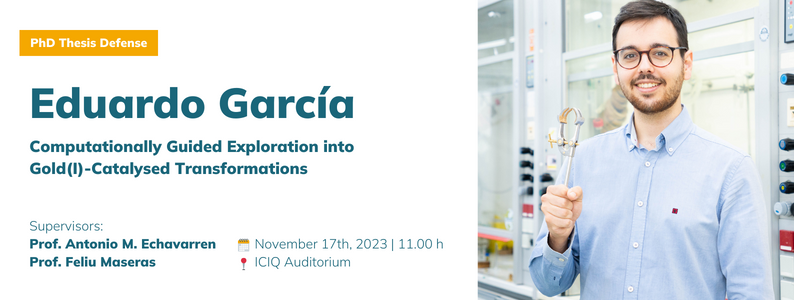 17/11/2023
17/11/2023
 11:00
11:00
 ICIQ Auditorium
ICIQ Auditorium
- Lecturer: Eduardo García
- Supervisors: Prof. Antonio M. Echavarren & Prof. Feliu Maseras
Computationally Guided Exploration into Gold(I)-Catalysed Transformations
Gold(I) catalysis, dominated by the activation of sp-hybridised carbons, has shown great versatility in organic synthesis due to their selectivity patterns, broad functional group tolerance and generally mild conditions. In the light of the limited available insight into more unusual observed reactivity, whether in shifting regio- and stereoselectivity, highly selective transformations or underexplored bimetallic systems, the work presented in this Doctoral Thesis intends to cover the explored mechanisms underpinning each of these reactions experimentally and computationally and presents rational approaches to reaction discovery.
We determined the nature of intermediates in gold(I)-catalysed transformations through DFT studies finding novel intermediates hitherto unreported. We described their bonding through NBO calculations and extended this study to a complete mechanistic understanding of single- and double-cleavage enyne rearrangements, uncovering the factors leading to stereoconvergence, exocyclic or endocyclic selectivity and single or double cleavage. Finally, a mechanistic investigation of enyne cyclisations and alkoxycyclisations provided the theoretical framework for the study of the role of the alcohol, as well as the patterns in enantioselective versions of these reactions.
The gold(I)-catalysed cyclotrimerisation of alkynes was then explored, showing unusual selectivity patterns. A subsequent thorough computational mechanistic investigation, validated through control experiments, suggested that the cyclotrimerisation proceeds through unique intermediates distinct from other metal-catalysed processes.
We finally designed a ligand platform to serve as a scaffold for bimetallic complexes containing gold(I). In addition to their synthesis and structural characterisation, we examined their reactivity and performed more in-depth combined computational and experimental work on the cyclometallated gold(I)-d8 metal complexes. Computational insight helped develop rational cooperative catalysis with the [AuAu] complexes.

Other events

Let's create a brighter future
Join our team to work with renowned researchers, tackle groundbreaking
projects and contribute to meaningful scientific advancements



















